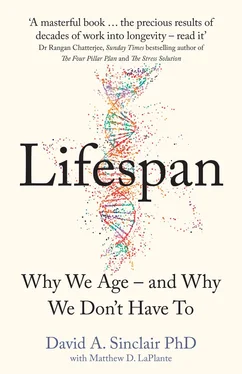At the age of 10, I had already discovered through exploration that the river in my backyard flowed down into Middle Harbor, a branch of Sydney Harbor. But I could no longer stand not knowing where the river originated. I needed to know what the beginning of a river looked like.
I followed it upstream, left the first time it forked and right the time after that, wending into and out of several suburbs. By nightfall I was miles from home, beyond the last mountain on the horizon. I had to ask a stranger to let me call my mother to beg her to come pick me up. A few times after that I tried searching upstream, but never did get anywhere close to the fount. Like Juan Ponce de León, the Spanish explorer of Florida known for his apocryphal quest to find the Fountain of Youth, I failed. 11 11 The Spanish explorer and conquistador’s search for the mystical spring known as the Fountain of Youth is apocryphal, but it makes for a good story. J. Greenspan, “The Myth of Ponce de León and the Fountain of Youth,” “History Stories,” April 2, 2013, A&E Television Networks, https://www.history.com/news/the-myth-of-ponce-de-leon-and-the-fountain-of-youth.
Ever since I can remember, I have wanted to understand why we grow old. But finding the source of a complex biological process is like searching for the spring at the source of a river: it’s not easy.
On my quest, I’ve wound my way left and right and had days when I wanted to give up. But I’ve persevered. Along the way, I have seen a lot of tributaries, but I’ve also found what may be the spring. In the coming pages, I will present a new idea about why aging evolved and how it fits into what I call the Information Theory of Aging. I will also tell you why I have come to see aging as a disease—the most common disease—one that not only can but should be aggressively treated. That’s part I.
In part II, I will introduce you to the steps that can be taken right now—and new therapies in development—that may slow, stop, or reverse aging, bringing an end to aging as we know it.
And yes, I fully recognize the implications of the words “bringing an end to aging as we know it,” so, in part III, I will acknowledge the many possible futures these actions could create and propose a path to a future that we can look forward to, a world in which the way we can get to an increased lifespan is through an ever-rising healthspan , the portion of our lives spent without disease or disability.
There are plenty of people who will tell you that’s a fairy tale—closer to the works of H. G. Wells than those of C. R. Darwin. Some of them are very smart. A few are even people who understand human biology quite well and whom I respect.
Those people will tell you that our modern lifestyles have cursed us with shortening lifespans. They’ll say you’re unlikely to see 100 years of age and that your children aren’t likely to get to the century mark, either. They’ll say they’ve looked at the science of it all and done the projections, and it sure doesn’t seem likely that your grandchildren will get to their 100th birthdays, either. And they’ll say that if you do get to 100, you probably won’t get there healthy and you definitely won’t be there for long. And if they grant you that people will live longer, they’ll tell you that it’s the worst thing for this planet. Humans are the enemy!
They’ve got good evidence for all of this—the entire history of humanity, in fact.
Sure, little by little, millennia by millennia, we’ve been adding years to the average human life, they will say. Most of us didn’t get to 40, and then we did. Most of us didn’t get to 50, and then we did. Most of us didn’t get to 60, and then we did. 12By and large, these increases in life expectancy came as more of us gained access to stable food sources and clean water. And largely the average was pushed upward from the bottom; deaths during infancy and childhood fell, and life expectancy rose. This is the simple math of human mortality.
But although the average kept moving up, the limit did not. As long as we’ve been recording history, we have known of people who have reached their 100th year and who might have lived a few years beyond that mark. But very few reach 110. Almost no one reaches 115.
Our planet has been home to more than 100 billion humans so far. We know of just one, Jeanne Calment of France, who ostensibly lived past the age of 120. Most scientists believe she died in 1997 at the age of 122, although it’s also possible that her daughter replaced her to avoid paying taxes. 13Whether or not she actually made it to that age really doesn’t matter; others have come within a few years of that age but most of us, 99.98 percent to be precise, are dead before 100.
So it certainly makes sense when people say that we might continue to chip away at the average, but we’re not likely to move the limit. They say it’s easy to extend the maximum lifespan of mice or of dogs, but we humans are different. We simply live too long already.
They are wrong.
There’s also a difference between extending life and prolonging vitality. We’re capable of both, but simply keeping people alive—decades after their lives have become defined by pain, disease, frailty, and immobility—is no virtue.
Prolonged vitality—meaning not just more years of life but more active, healthy, and happy ones—is coming. It is coming sooner than most people expect. By the time the children who are born today have reached middle age, Jeanne Calment may not even be on the list of the top 100 oldest people of all time. And by the turn of the next century, a person who is 122 on the day of his or her death may be said to have lived a full, though not particularly long, life. One hundred and twenty years might be not an outlier but an expectation, so much so that we won’t even call it longevity; we will simply call it “life,” and we will look back with sadness on the time in our history in which it was not so.
What’s the upward limit? I don’t think there is one. Many of my colleagues agree. 14There is no biological law that says we must age. 15Those who say there is don’t know what they’re talking about. We’re probably still a long way off from a world in which death is a rarity, but we’re not far from pushing it ever farther into the future.
All of this, in fact, is inevitable. Prolonged healthy lifespans are in sight. Yes, the entire history of humanity suggests otherwise. But the science of lifespan extension in this particular century says that the previous dead ends are poor guides.
It takes radical thinking to even begin to approach what this will mean for our species. Nothing in our billions of years of evolution has prepared us for this, which is why it’s so easy, and even alluring, to believe that it simply cannot be done.
But that’s what people thought about human flight, too—up until the moment someone did it.
Today the Wright brothers are back in their workshop, having successfully flown their gliders down the sand dunes of Kitty Hawk. The world is about to change.
And just as was the case in the days leading up to December 17, 1903, the majority of humanity is oblivious. There was simply no context with which to construct the idea of controlled, powered flight back then, so the idea was fanciful, magical, the stuff of speculative fiction. 16
Then: liftoff. And nothing was ever the same again.
We are at another point of historical inflection. What hitherto seemed magical will become real. It is a time in which humanity will redefine what is possible; a time of ending the inevitable.
Indeed, it is a time in which we will redefine what it means to be human, for this is not just the start of a revolution, it is the start of an evolution.
Читать дальше












